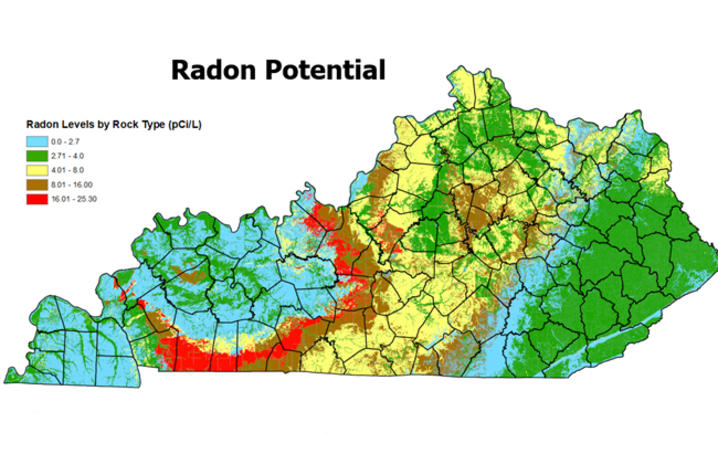Researchers Awarded $2.6 Million to Engage 'Citizen Scientists' to Reduce Radon Exposure in Rural Areas
LEXINGTON, KY. (May 4, 2020) – Researchers in the University of Kentucky College of Nursing’s BREATHE (Bridging Research Efforts and Advocacy Toward Healthy Environments), in conjunction with the Kentucky Geological Survey, the UK College of Public Health, Area Health Education Centers (AHEC), and other community partners in Kentucky were awarded a $2.6 million grant from the National Institute of Environmental Health Sciences to engage and educate citizens of Kentucky on the increased risk of lung cancer due to environmental exposures from radon and tobacco smoke.
“Kentuckians experience a trifecta in lung cancer,” said Ellen J. Hahn, PhD, principal investigator of the new grant. “Our residents smoke tobacco at high rates; our geology puts us at risk for high radon exposure; and two-thirds are regularly exposed to secondhand smoke at work. This grant will help us develop and test a novel approach to reducing radon risk in our state.”
Radon is a naturally occurring radioactive gas that is formed when radioactive compounds break down in rocks, soil and groundwater. It cannot be seen, smelled or tasted, and people are exposed by breathing radon in air when it comes in through gaps and cracks in their homes. It is the second-leading cause of lung cancer after tobacco smoking.
Radon is a danger for everyone, but the effects of radon gas are made worse by also breathing tobacco smoke. Radon gas attaches to dust and smoke in the air and can be inhaled. The risk of lung cancer increases dramatically when people are exposed to both radon and tobacco smoke. Kentucky has the highest rate of lung cancer in the country.
“Kentucky is known for being No.1 in many things, but in the case of lung cancer and other breathing disorders, we can save lives and money if we minimize environmental exposure to radon and tobacco smoke,” said Dr. Hahn, who also directs the Center for Appalachian Research in Environmental Sciences (UK-CARES).
“This is an exciting collaboration because it allows us to use Kentucky's unique statewide digital geologic map coverage to better explain differences in the danger posed by radon in different parts of the commonwealth,” said Bill Haneberg, director of KGS and state geologist for Kentucky. “The more we know about radon sources, the better we can effectively communicate its danger and take steps to reduce its harmful effects.”
In the Radon on the RADAR (Residents Acting to Detect and Alleviate Radon) study, a multi-disciplinary team of researchers will identify geological and atmospheric conditions that increase radon intrusion into homes, translate this knowledge into increased residential awareness of lung cancer risk, facilitate home radon testing, and report back and increase access to affordable and adequate radon mitigation. By engaging residents of rural Kentucky communities and training them to be “citizen scientists,” researchers can create sustainable environmental health action plans to alleviate radon exposure in rural communities.
The grant has five goals:
- To use a citizen science approach to identify and train up to 60 community residents in four rural Kentucky counties to test for radon and evaluate change in environmental health literacy and their ability to change their health behavior.
- To compare observed indoor radon values and soil radon values over time, using different radon monitoring devices in citizen scientists’ homes, controlling for atmospheric conditions, seasonality, geology, topography, and smoking in the home.
- To create and evaluate a pilot program to loan radon testing equipment via a library loan program to 400 homeowners in the four counties.
- To expand the pilot program to loan radon testing equipment radon testing equipment library loan program to an estimated 4,320 residents and examine the annual change in information-seeking behaviors, including home testing and accessing geologic maps.
- To examine the impact of citizen scientist-led radon coalitions on reach, effectiveness, adoption, implementation, maintenance, and environmental health literacy. The RADAR study challenges and expands the current environmental health science paradigm by collaborating with geologists and integrating their scientific approach.
ABOUT THE RESEARCHERS
BREATHE
The Radon Policy Division of BREATHE located in the College of Nursing, developed in 2006 and funded in part by the Kentucky State Radon Program, houses an evidence-based community outreach and research center to raise awareness about the dangers of radon exposure and prompt action to reduce radon risks using evidence-based practices.
Kentucky Geological Survey
The Kentucky Geological Survey is a state-supported research center and public resource within the University of Kentucky whose mission is to support sustainable prosperity of the commonwealth, the vitality of its flagship university, and the welfare of its people. They do this by conducting research and providing unbiased information about geologic resources, environmental issues, and natural hazards affecting Kentucky.
BREATHE researchers have collaborated with scientists at the Kentucky Geological Survey (KGS) to develop a geologic radon potential map. See the interactive map at KGS and the county-level radon maps here.
As the state’s flagship, land-grant institution, the University of Kentucky exists to advance the Commonwealth. We do that by preparing the next generation of leaders — placing students at the heart of everything we do — and transforming the lives of Kentuckians through education, research and creative work, service and health care. We pride ourselves on being a catalyst for breakthroughs and a force for healing, a place where ingenuity unfolds. It's all made possible by our people — visionaries, disruptors and pioneers — who make up 200 academic programs, a $476.5 million research and development enterprise and a world-class medical center, all on one campus.






